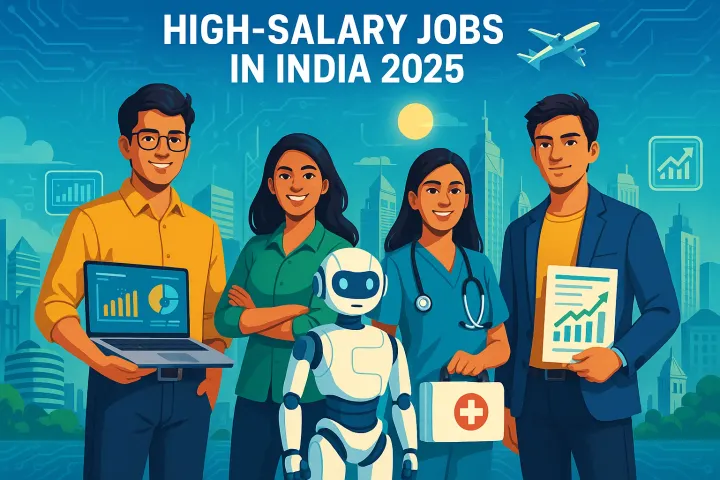Exploring Information Technology Jobs in India: Opportunities, Trends, and Resources for 2025
India’s Information Technology (IT) sector is a powerhouse, contributing ~7.4% to the nation’s GDP and employing over 5.4 million professionals
India’s Information Technology (IT) sector is a powerhouse, contributing ~7.4% to the nation’s GDP and employing over 5.4 million professionals as of March 2023. With a projected market growth at a CAGR of 10.49% through 2029, driven by advancements in AI, cloud computing, and cybersecurity, IT jobs in India offer immense opportunities for freshers and experienced professionals alike. This article dives into the current landscape of IT jobs in India, key roles, salary insights, top employers, emerging trends, and resources to help you land your next IT job in 2025.
The IT Industry in India: A Snapshot
The IT-BPM (Business Process Management) sector generated $253.9 billion in revenue in FY24, with $194 billion from exports. Cities like Bengaluru (38% of IT exports), Hyderabad, Chennai, Pune, Delhi-NCR, and Mumbai are major IT hubs, while emerging cities like Noida and Kochi are gaining traction. The industry employs millions and is poised for a 30-35% surge in demand for roles leveraging AI and machine learning in 2025, according to industry reports.
Popular IT Job Roles and Salaries
Here’s a look at some in-demand IT roles in India, along with their average annual salaries (based on data from platforms like AmbitionBox and Glassdoor):
- Network Administrator: ~₹4.3 lakh
Manages computer networks, configures systems, and monitors performance. Requires a bachelor’s degree in IT or computer science and networking certifications like CCNA. - Cloud Engineer: ~₹5.2 lakh
Designs and implements cloud infrastructure. Expertise in AWS, Azure, or Google Cloud is a plus. - UX Designer: ~₹5.7 lakh
Focuses on user experience, product usability, and branding. Strong design skills and a degree in IT or design are preferred. - Software Application Packager: ~₹6.4 lakh
Develops and tests software installation packages. Analytical skills and IT degrees are essential. - Full-Stack Developer: ~₹7.5 lakh
Handles both front-end and back-end development, requiring knowledge of databases, UI/UX, and frameworks like React or Node.js. - Development Operations (DevOps) Engineer: ~₹8.7 lakh
Streamlines software development and deployment. Proficiency in tools like Docker and Kubernetes is key. - Data Science Intern (Fresher): Salaries vary, but roles in cities like Mumbai focus on machine learning, Python, and data analysis, offering competitive pay for entry-level positions.
Note: Salaries depend on experience, location, and company size. Check AmbitionBox or Glassdoor for real-time updates.
Top Employers in India’s IT Sector
- Major IT Firms: Tata Consultancy Services (TCS), Infosys, HCLTech, Accenture, Capgemini, and Tech Mahindra dominate the industry.
- Global Giants: Companies like Google India, EY, and Intuit have a strong presence, offering roles in AI, cloud, and analytics.
- Government Opportunities: Roles like Computer Assistant at the Indian Institute of Management or IT Officer in the Indian Navy are available through platforms like MySarkariNaukri.
- Global Capability Centers (GCCs): GCCs created ~100,000 IT jobs in FY24, outpacing traditional IT firms, per Economic Times.
- Startups: Emerging startups in AI, fintech, and edtech are hiring for roles like Flutter or React Native developers, often listed on platforms like TechKareer.
Emerging Trends Shaping IT Jobs
- AI and Machine Learning: Demand for AI engineers and data scientists is soaring, with companies like EY offering upskilling programs like the EY Tech MBA.
- Cloud Computing: Roles in AWS, Azure, and Google Cloud are in high demand as businesses shift to cloud-based solutions.
- Cybersecurity: With rising cyber threats, cybersecurity analysts are critical, requiring skills in ethical hacking and risk management.
- Automation Concerns: While AI tools like ChatGPT may automate some coding tasks, they are unlikely to replace IT professionals entirely, as per discussions on X. Instead, they create demand for AI integration roles.
- Upskilling: Certifications in AI, blockchain, and cloud computing are essential to stay competitive. Platforms like Coursera and Udemy offer relevant courses.
Challenges in the IT Job Market
- Hiring Slowdown: Top firms like TCS, Infosys, and HCLTech cut 71,285 jobs in FY23 due to reduced global demand, per Economic Times.
- Fake Credentials: The industry faces issues with fraudulent experience certificates, leading to stricter hiring processes, as noted on LinkedIn.
- Automation Risks: Up to 69% of IT-BPM jobs could be automated by 2030, but new roles in AI and cybersecurity are expected to offset losses.
Opportunities for Freshers
Freshers with a bachelor’s degree in IT, computer science, or related fields can explore roles like:
- IT Engineer/Support: Available in cities like Delhi (305+ jobs on Indeed).
- Web Developer: Roles requiring HTML, CSS, and JavaScript skills.
- Data Science Intern: Mumbai offers 88+ fresher roles in machine learning and Python, per Naukri.
- Certifications: Courses in AI, cloud, or networking (e.g., AWS Certified Solutions Architect, Cisco CCNA) boost employability.
How to Find IT Jobs in India
- Job Portals:
- Company Career Pages: Apply directly on websites of TCS, Google, or Capgemini.
- Government Jobs: Explore MySarkariNaukri for roles like Data Entry Operator or IT Officer.
- Networking: Engage with communities on LinkedIn or TechKareer for internships and AI-focused roles.
Future Outlook
With India’s internet user base expected to hit 900 million by 2025, per Statista, the IT sector will continue to grow, creating jobs in AI, cloud, and cybersecurity. Despite automation concerns, professionals who upskill in emerging technologies will thrive. The rise of GCCs and startups ensures a dynamic job market, particularly in hubs like Bengaluru and Hyderabad.
Conclusion
India’s IT sector offers a wealth of opportunities for professionals at all levels. Whether you’re a fresher seeking entry-level roles or an experienced candidate aiming for high-demand positions like DevOps or AI engineering, the key is to stay updated with skills and leverage job platforms. Explore resources like Naukri, LinkedIn, and Coursera to kickstart or advance your IT career in 2025.
For specific job listings in your city or role, let me know, and I can tailor a search using real-time data from platforms like Indeed or LinkedIn.




Comments ()